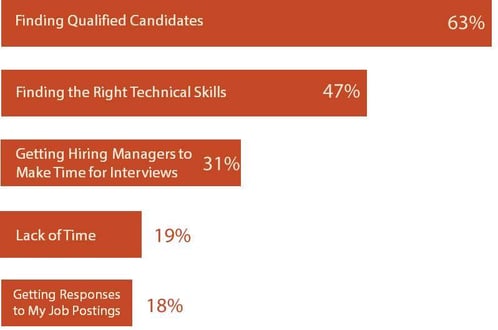 For the second year in a row, “Finding qualified candidates” and “Finding the right technical skills” topped the list of recruitment challenges in our Global Talent Recruitment Survey. This year, we also asked what roles people were having the most difficulty filling.
For the second year in a row, “Finding qualified candidates” and “Finding the right technical skills” topped the list of recruitment challenges in our Global Talent Recruitment Survey. This year, we also asked what roles people were having the most difficulty filling.
In this post, we’re going to look at that list and discuss some of the potential causes and solutions.
First, let’s have deeper look at the top recruitment challenges that came out of our survey of more than 450 HR professionals from around the globe:
Top Talent Recruitment Challenges

More than 1/3rd of our respondents also told us that it was more difficult to fill openings than it was a year ago. When we asked them which roles they were having the most trouble filling, “specialized technical roles” topped the list (54%), followed by “mid-management” (37%).
What Roles Are You Having Difficulty Filling?

Leadership Development for Millennials
We expect to see the percentage for middle managers on the graph above grow in coming years. The retirement of the baby boomers means that there are fewer and fewer employees with experience to fill those roles. There aren’t enough Gen-Xers to fill the gaps, so that means that companies will have to look to Millennials to fill the void. It’s imperative that companies spend time to understand what makes these employees tick, what motivates them, and how to effectively coach them in order to develop them in time to fill future leadership needs. Companies that do succeed in preparing their Millennials for leadership roles will be poised to outpace the competition.
To better equip these young employees to fill the growing management vacancies, there are a number of strategies companies can take on, including:
- Provide opportunities to learn multiple areas of the company through job rotation and job shadowing
- Equip them with the basic tools by training them on time management, communication, and presentation skills
- Invest in training to allow them to develop new/deeper skills
- Provide regular feedback and coaching
- Use mentoring/reverse mentoring
Research and anecdotal evidence both point to the fact that Millennials are looking for employers that offer training and development, a clear career path, and ongoing coaching and feedback. It seems they’re looking for exactly what employers need to give them to get ready for management roles quickly.
What are you doing to develop your Millennials into future leaders?
Download the complete survey report here.
Photo courtesy of Flicker CC and Tom Magliery